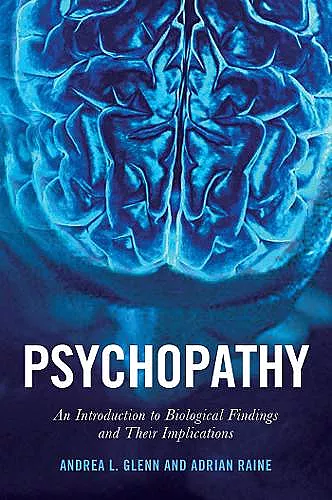Psychopathy
An Introduction to Biological Findings and Their Implications
Adrian Raine author Andrea L Glenn author
Format:Hardback
Publisher:New York University Press
Published:7th Mar '14
Currently unavailable, and unfortunately no date known when it will be back
This hardback is available in another edition too:
- Paperback£25.99(9780814745441)

A concise overview of the neuropsychology of psychopathy, written in layman's terms
The last two decades have seen tremendous growth in biological research on psychopathy, a mental disorder distinguished by traits including a lack of empathy or emotional response, egocentricity, impulsivity, and stimulation seeking. But how does a psychopath’s brain work? What makes a psychopath?
Psychopathy provides a concise, non-technical overview of the research in the areas of genetics, hormones, brain imaging, neuropsychology, environmental influences, and more, focusing on explaining what we currently know about the biological foundations for this disorder and offering insights into prediction, intervention, and prevention. It also offers a nuanced discussion of the ethical and legal implications associated with biological research on psychopathy. How much of this disorder is biologically based? Should offenders with psychopathic traits be punished for their crimes if we can show that biological factors contribute? The text clearly assesses the conclusions that can and cannot be drawn from existing biological research, and highlights the pressing considerations this research demands.
"This innovative work presents the very latest and best science on the topic of psychopathy and biology. It is a tour de force with its coverage of the primary areas of biological research, explanation of the techniques used in biological research, and its coverage of existing findings on the topic. With this book, Glenn and Raine uncover hints regarding the biological underpinnings of psychopathy and the implications that biology has for the development, nature and treatment of this syndrome. Well informed and incredibly well written this book is a valuable source for those wanting to know more about psychopathy in general but especially those wanting to learn more about its biological roots and the contextual factors that affect its development and consequent variations. This book points to many avenues for future science and is highly relevant to a full range of trainees and professionals working in psychology, psychiatry, and other allied mental health professions. Glenn and Raine hit the mark with this incredibly powerful book that is also relevant to those in the general public who are interested in the biological foundations of psychopathy." -- Randall Salekin,University of Alabama
"Psychopathy: An Introduction to Biological Findings and Their Implicationsis an impressive achievement, covering decades-long research on the neurobiology of antisocial behaviour and psychopathy. Frequently authors cannot see the wood for the trees, but the book clearly maps the growing forest that is our understanding of environmental, neurobiological and genetic contributions to psychopathy." * Times Higher Education *
"InPsychopathy,Andrea L. Glenn and Adrian Raine rigorously and cleverly summarize a multitude of findings from studies of behavior, cognition, and brain functioning. . . . [T]he book can be appreciated by students who want to be introduced to one of the domains of cognitive neuroscience that is rather complex and in the process of restructuring itself into not only a legitimate field of study, but also one that is independent from criminology. The book can also be an interesting and useful read for established researchers who want to assess the strengths and weaknesses of a domain before considering it as a field of study. All in all, the text is a good and valuable read which is difficult to put down." * Metapsychology *
"Psychopathyis one in a long list of publications designed to provide an overarching summary of a hypothetical neurobiological model of the disorder with the authors goal being to define the disorder in terms of neurobiological deficits, with each of the nine chapters summarizing the presumed influence of a particular factor." * PsycCRITQUES *
ISBN: 9780814777053
Dimensions: unknown
Weight: unknown
254 pages